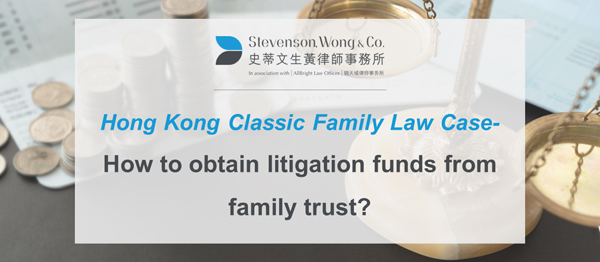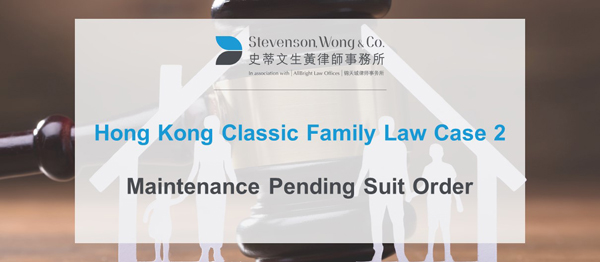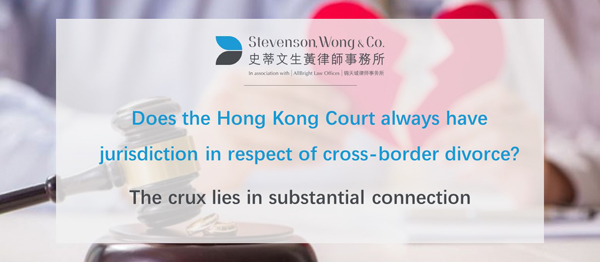SW Private Client Law Updates
Find out all about our firm’s latest SW Private Client Law Updates below. To learn more about any individual item, please contact us here.
SW Private Client Law Updates
Find out all about our firm’s latest SW Private Client Law Updates below. To learn more about any individual item, please contact us here.
Since Hong Kong is an international commercial centre, not only locals, but people from the Mainland or other overseas countries may have different kinds of assets in Hong Kong. When a person passes away, it is possible that his/her estate includes assets in Hong Kong, such as cash at banks, shares and real properties etc.
Regardless of whether the deceased had left a will, anyone who needs to manage the deceased’s assets in Hong Kong must apply for a Grant of Representation (“Grant”) from the Probate Registry of the High Court of Hong Kong Administrative Region. The Grant includes Probate, Letters of Administration, or Letters of Administration with Will Annexed. The Grant is a document issued by the Court confirming the authority of the personal representative to administer the estate of the deceased.
We are often faced with cases involving foreign elements for the matters we handle. For example, where the deceased had assets outside of Hong Kong, or vice versa, where Mainland or overseas domiciled deceased had assets in Hong Kong. This gives rise to the following questions: What law governs the administration and succession of the Hong Kong estate? How to inherit such estate?

The following common law rules apply in Hong Kong:
What is Domicile?
When administrating the deceased’s estate in Hong Kong, the first thing is to identify his/her place of domicile. At common law, domicile is defined as “the place or country which is considered by law to be a person’s permanent home”. In Hong Kong, the concept of domicile is governed by the Domicile Ordinance (Cap.596). In general, domicile is determined by a person’s presence in a country and his/her intention to make a home in that country for an indefinite period.
Factors which are relevant to determining the domicile of a deceased are, but not limited to, the followings:-
1. The nationality of the deceased;
2. In which country or place did the deceased live before his/her death; and
3. On what basis did the deceased live in that country or place.

The Probate Registry will also take the following factors into account when determining whether the deceased had the intention to make a home in Hong Kong indefinitely:-
1. Whether the deceased’s presence in Hong Kong was legal;
2. For how long the deceased had stayed in Hong Kong;
3. Did the deceased have a consistent place of residence and a job in Hong Kong;
4. Whether the deceased had most of the assets in Hong Kong; and
5. Whether the deceased had friends and/or relatives in Hong Kong.
How does domicile affect the application procedures for a Grant in Hong Kong?
1. The deceased died domiciled in Hong Kong
The intended personal representative(s) should make an application to the Probate Registry for a Probate (where the deceased died testate), a Letters of Administration (where the deceased died intestate) or a Letters of Administration with Will Annexed (where the deceased made a Will but no executors can be appointed).
To apply for a Grant, the applicant(s) have to bring along the originals of the Will (if applicable) and the death certificate to the Probate Registry. Once filed into the Court, the original Will (if applicable) and the original death certificate will not be returned to the applicant(s). There are also Specified Forms to be completed for the application. The applicant(s) also have to prepare a Schedule of Assets or Liabilities to set out everything the deceased owned and/or owed in Hong Kong as at the date of his/her death. The same will be attached to the Grant to facilitate the administration of the estate.

2. The deceased died domiciled outside Hong Kong
(1) The deceased died domiciled in the common law countries/jurisdictions under section 49 and Schedule 2 of the Probate and Administration Ordinance (Cap. 10)
These countries include:-
If the application for a Grant is not contested, the executor(s) or administrator(s) can first obtain a Grant in the place of the deceased’s domicile. Afterwards, they can apply for the foreign Grant to be resealed in Hong Kong. The resealed Grant has the same legal force and effect as the Grant issued by the Probate Registry. When applying for the resealing of a foreign Grant, the applicant(s) should bring along the followings:-
(2) The deceased died domiciled in Mainland China
If the deceased, being a PRC resident, had assets in Hong Kong, the executor(s) or administrator(s) should make a fresh application to the Probate Registry for a Grant. If the deceased had immovable property in Hong Kong, the entitlement to the Grant will be governed by the Non-Contentious Probate Rule under the laws of Hong Kong; if the deceased had movable property such as cash at bank or shares, the PRC succession law will be applied. The Probate Registry will rely on the legal opinion by a PRC lawyer explaining who is entitled to apply for the Grant and who is entitled to the distribution of the estate etc.
Where the administration of the estate is governed by the law of succession of the PRC, the Probate Registry will also require the following notarised documents:-
These certificates are issued by the Notarial Office of the PRC, and have to be authenticated by the authorised Officer of the Consular Department of the Ministry of Foreign Affairs of the PRC.

Conclusion
This article introduces the procedures to the application of a Hong Kong Grant. It is crucial to determine the deceased’s domicile, the content of his/her Will and the nature and whereabouts of the estate. If the deceased died domiciled outside Hong Kong, it is necessary to engage overseas lawyers to work with lawyers in Hong Kong for the administration of the estate.
This article is co-authored by our experienced SW Private Team –Partners Catherine Por and Wendy Lam, and our Senior Associates Karl Wong and Calvin Lo. Please contact Catherine Por or Wendy Lam for any further enquiries or information.
This newsletter is for information purposes only. Its content does not constitute legal advice and should not be treated as such. Stevenson, Wong & Co. will not be liable to you in respect of any special, indirect or consequential loss or damage.
We acted for the Petitioner (“the Wife”) in the Hong Kong High Court case KCMA v ABC and others [2020] HKCFI 848. The Wife obtained litigation funds of HK$1,500,000 from the Family Trust.

Background
This was a high conflict case. It involved a lot of legal issues, including but not limited to two applications under section 17 of the Matrimonial Proceedings and Property Ordinance, Cap 192 (“MPPO”) (relating to avoidance of transaction intended to defeat certain claims) and other ownership/trust issues.
In the present case, the Wife sought periodical payments to be applied towards her litigation funding from the Husband, or alternatively the Husband to cause distribution from the Family Trust, which was estimated by the Husband at HK$98,000,000. Both the Husband and the Wife were the beneficiaries of the Family Trust.

Legal Principles
The Court pointed out in its judgment that it has the power to include an element for legal costs provision in an order for maintenance pending suit under the MPPO. The Court cited the recent case WW and LLN [2020] HKCA 178, CACV 524/2019:
“The principles for granting litigation funding are well-established:
The court should be alert to the risk of injustice arising from irrecoverable and/or unmerited sums paid for litigation funding, which would call for extra caution in the balancing exercise.
‘… the whole purpose of alimony pending suit is to sustain the petitioner pending the court’s determination. There is manifestly a risk of unjustified and irrecoverable payments, but that has to be balanced against the risk of a denial of access to justice for the petitioner, if she has not the means to sustain herself and the litigation pending its determination.'”

Court’s Decision
The Means of the Wife and the Husband
On the basis of the facts of the case and the abovementioned legal principles, the Court made the following findings in relation to the means of the Wife and the Husband:-
The Wife’s means – The Wife alleged that, during her 15 years marriage to the Husband, she was, and still is, a homemaker, and financially dependent on the Husband. She did not hold any assets of value. The Court was satisfied that the Wife did not have sufficient asset held in her name which can reasonably be deployed. Although there was no evidence that she had made any application for legal aid, given that she had received MPS and other financial resources from the Family Trust, the Wife would not have met the means test required to be passed when making an application for legal aid.
The Husband’s means – The Husband alleged that since he was unable to obtain any distribution from the Family Trust, he could not afford to pay the litigation funds sought by the Wife, nor his own legal costs.
The Court adopted a broad brush approach in considering the means of the parties, and came to the conclusion that there was no sufficient evidence to show that the Husband would be able to pay the Wife’s and his own litigation costs without receiving any distribution from the Family Trust.
The Family Trust
The Court then made findings on the distribution from the Family Trust. The Court pointed out that, in their letter correspondence, the solicitors for the parties have already suggested to use the distribution from the Family Trust as litigation funds for the Wife.
The Court was of the view that, given both parties were the beneficiaries, they could not cause any distribution of the Family Trust as this is within the discretion of the Trustee, but the Wife or the Husband could have simply agreed to the Joint Request for distribution from the Family Trust on a without prejudice basis.

Conclusion
During divorce proceedings, if one (e.g. the Wife in this case) does not have sufficient financial resources, but at the same time has to bear living expenses, children’s maintenance and litigation costs, one should carefully consider obtaining financial support (e.g. distribution from Family Trust in the present case despite the live issues arising from the settlement) in order to maintain a living and support the conduct of the legal proceedings.
This article is co-authored by our experienced Private Client Team – our Partners Catherine Por and Wendy Lam, and our Senior Associates Karl Wong and Calvin Lo. Please contact our Catherine Por or Wendy Lam for any further enquiries or information.
This newsletter is for information purposes only. Its content does not constitute legal advice and should not be treated as such. Stevenson, Wong & Co. will not be liable to you in respect of any special, indirect or consequential loss or damage.
In most Hong Kong divorce proceedings, an application for maintenance pending suit (“MPS”) is one of the crucial matters for consideration. It often takes a year for a divorce and even longer when there are disputes in the main suit, custody and welfare of children of the family, and/or ancillary relief and division of the matrimonial assets. Can a party to the divorce proceedings receive maintenance in any kind if he/she does not have sufficient financial resources pending suit?
According to section 3 of the Matrimonial Proceedings and Property Ordinance (Cap. 192) (“MPPO”), Hong Kong Court has the discretion to order a party to the divorce proceedings to pay MPS to the other party. If the financially weaker spouse and/or the children do not have sufficient financial resources to sustain their expenses, the spouse can apply to the Court for MPS. If granted, the Court normally orders payments for MPS to commence immediately, which lasts until the final ancillary relief order or further order of the Court. In making such order, the Court is required to balance the reasonable needs of the applicant spouse and/or the children against the paying spouse’s ability to pay by adopting a broad brush approach.

However, after the MPS Order has been awarded, either party can apply for variation of the said Order due to any change in his/her financial circumstances such as income, assets and/or liabilities. Since the variation will have great impact on the party receiving the MPS, the Court will take extra care in considering any variation application.
In this article, we will share and explain the legal issues in KCMA v ABC and others [2020] HKCFI 1078 in relation to an application to vary the MPS Order.

Background
We acted for the Wife who successfully defended against the Husband’s application to adjust the MPS Order downward at the High Court on an urgent basis during the General Adjourned Period enforced by the Judiciary during the COVID-19 crisis. Pursuant to the previous MPS Order made by consent, the Husband was to pay, amongst others, MPS for the Wife at HK$26,450 per month and MPS for the 3 children at HK$79,350 per month (HK$26,450 for each child).
The Husband sought to reduce the MPS to HK$13,600 per month for the Wife and HK$13,600 per month for each child on the basis that there had been a material decrease in his income.
Legal Principles
Section 11(1) of MPPO empowers the Court to vary or discharge the order of financial provision; section 11(7) of MPPO stipulates that in exercising the power under section 11(1), the Court is required to have regard to all the circumstances of the case and any changes on matter to which the Court was required to have regard when making the MPS Order.

In addition, the Court cited the principles from a Court of Appeal judgment AEM and VFM [2008] 3 HKLRD 36, CACV 261/2006:
Court’s Decision
The husband’s application was refused based on the abovementioned statutory and common law principles. The Court had taken into consideration the following factors:
After considering all the factors, the Court decided that the Husband was able to afford the MPS, and that even after paying the MPS, he would still have the funds to cover his daily expenditures.
Although the Husband claimed that the duration of the MPS Order was unexpectedly long, the Court pointed out that the MPS Order had been made by consent, and was based on the Husband’s average income for at least 3 years. There was no evidence that the parties had intended that such agreement was to be re-visited or varied annually.

Commentary
MPS is an important matter to be considered in the divorce proceedings. The Court is required to balance the reasonable needs of the applicant spouse and/or the children against the paying spouse’s ability to pay by adopting a broad brush approach.
When either party subsequently seeks to vary a MPS Order, the Court will carefully scrutinise the application. As the Court of Appeal principle cited by the judge in the present case, “the basis and intended effect of the original order are relevant factors to which the Court on variation should pay regard, and there should not be a radical departure from the approach taken by the parties themselves when they had entered into an agreement embodied in a consent order”.
This article is co-authored by our experienced Private Client Team – our Partners Catherine Por and Wendy Lam, and our Senior Associates Karl Wong and Calvin Lo. Please contact our Catherine Por or Wendy Lam for any further enquiries or information.
This newsletter is for information purposes only. Its content does not constitute legal advice and should not be treated as such. Stevenson, Wong & Co. will not be liable to you in respect of any special, indirect or consequential loss or damage.
The Hong Kong Court dismissed the Petitioner Wife’s Petition in a divorce case for want of jurisdiction, ruling that the Petitioner Wife had lacked substantial connection with Hong Kong.

Traditionally, the Hong Kong Court is one of the more popular jurisdictions to initiate divorce proceedings for couples with overseas connections, especially the expatriate community, due to the city’s international exposure. In recent years, as the Mainland and Hong Kong integrate social-economically, cross-border marriages between the Mainland and Hong Kong have increased prevalently. Currently, Mainland-Hong Kong cross-border marriages account for almost one-third of the 50,000 marriages registered every year in Hong Kong, while around 20,000 couples petition for divorce yearly.
A vital consideration in international or cross-border marriages is the choice of jurisdiction. In this respect, the Hong Kong Court has a set of clear guidelines in respect of its divorce jurisdiction. Not everyone can petition for a divorce in Hong Kong. By illustrating a recent Mainland-Hong Kong cross-border divorce case handled by our Private Client Department, this article sheds light on the Hong Kong Court’s approach to the issues of jurisdiction and forum in cross-border divorce cases.
This is a divorce case in relation to Mr Y and Ms C, who is a Hong Kong Permanent Resident. In August 2017, Ms C petitioned for divorce in the Hong Kong Family Court on the ground that she had substantial connection with Hong Kong at the date of her petition. Therefore, as per Ms C, the Hong Kong Court had jurisdiction over her divorce proceedings.
Our client Mr Y applied to the Court to dismiss Ms C’s Petition for the reasons as follows:- (a) the Court does not have jurisdiction over the case; or (b) the proceedings should be stayed on the ground of forum non conveniens and be heard in the Beijing People’s Court.
In order to establish her substantial connection with Hong Kong, Ms C relied on a number of matters, namely, (1) Ms C is a holder of Hong Kong Permanent Identity Card, Hong Kong Special Administrative Region passport and has obtained permanent residency; (2) Ms C was employed by a Hong Kong company and had come to Hong Kong regularly on business trip, establishing social network in Hong Kong; (3) the parties purchased a property in Hong Kong as their matrimonial home; and (4) Ms C maintains a bank account in Hong Kong.

Issue 1: Does the Hong Kong Court have jurisdiction – does Ms C have substantial connection with Hong Kong?
Section 3(c) of the Matrimonial Causes Ordinance (Cap. 179) sets out the Hong Kong Court’s position on divorce jurisdiction:- either party to the marriage is required to have substantial connection with Hong Kong at the date of petition.
How to determine the issue of substantial connection – the Court quoted the principles in ZC v NC (Divorce jurisdiction) [2014] 5 HKLRD 43 in this respect:-
Applying the legal principles above, the Court ruled on the matters relied by Ms C to establish substantial connection as such:-

Issue 2: Even if the Hong Kong Court has the relevant jurisdiction, is the principle forum non conveniens applicable such that the case should be heard in the Beijing Court?
The Court also ruled in favour of Mr Y for his application to stay the proceedings in Hong Kong on the ground of forum non conveniens. Applying the guiding principles as set out in the Court of Final Appeal case SPH v SA [2014] 3 HKLRD 497, the Court came to the conclusion that:-
Applying the legal principles to the facts of this case, the Court held that Ms C failed to prove that she had substantial connection with Hong Kong as at the date of Petition. Accordingly, the Court dismissed Ms C’s Petition for want of jurisdiction. Even if the Hong Kong Court had the relevant jurisdiction, the Court still considered the Beijing Court to be a more appropriate forum to hear the case.
This is a very typical Mainland-Hong Kong cross-border divorce case, primarily on the Hong Kong Court’s approach to its divorce jurisdiction and incidental disputes. When a marriage has come to an end, the party who is minded to petition for a divorce in Hong Kong is advised to produce sufficient evidence, especially for establishing either party’s substantial connection with Hong Kong. This serves to invoke the divorce jurisdiction of Hong Kong Court and to establish that Hong Kong Court is the more appropriate forum to hear the case.
This article is co-authored by our experienced Private Client Team – our Partners Catherine Por and Wendy Lam, and our Senior Associates Karl Wong and Calvin Lo. Please contact our Catherine Por or Wendy Lam for any further enquiries or information.
This newsletter is for information purposes only. Its content does not constitute legal advice and should not be treated as such. Stevenson, Wong & Co. will not be liable to you in respect of any special, indirect or consequential loss or damage.
(中文) 大数据与国际合作带来了查税方法变天:揭露最新查税案例,顺道“考察”美国取消自首计划与CRS最新执行规则,老好日子过去了!

这是最近更多客户需要公司架构重组,交易流程设计,税务体检梳理,合理税务规划,家族信托搭建,身份税籍安排,代持关系纠正,资产保护方案等的原因。通过私人银行与家族办公室的询问明显增多。
1)警税合作抓捕买票企业

营改增为金税三期税务信息联网创造良好条件。国家税务总局公告[2017]第16号文《关于增值税发票开局有关问题的公告》,明确增值税发票需要有购买方纳税人识别号才可以作为税收凭证。
看似不重要的税号,发票开给谁就更清楚了,整个利润网就这样建立。不管企业如何申报利润,税局已经通过这个发票网掌握了每家企业大概利润情况。就像孩子撒谎,父母早知道,只是有没有说穿而已。
不只这样,税局同时更了解各行业开销情况;行业平均数据对比被查企业情况,买票企业清单就到手了,税局查税没难度。这就是大数据的威力!
当时我们预测抓捕买票企业的时候来了。言犹在耳,北京海淀国税局与警方联合550余人,抓捕上百买票企业负责人,涉及发票 2.8亿(4800份)。本来税局就懂数据分析;现在加上公安的执法与侦查优势作举证后盾,这就是税局执法新常态,各位企业主小心了!
其实增值税是有筹划空间的。游戏规则改变了,为什么还在难为财务长呢?
2)跨境情报交换征查个税

国家税务总局《个人所得税自行纳税申报方法》规定,年所得12万元以上的纳税人,在纳税年度结束3个月内,应当向税局独立办理申报。这个看似多余的申报,却使高收入人群(主要是企业主与高管)没法在企业代扣代缴个税下免责。
我们在做客户讲座或培训时经常发现一个现象:中国企业主都知道美国是全球所得征税,却不知道中国也是!结论:海外所得的个税申报是不能以“代扣代缴”为借口的。对有离岸公司操作外贸的企业主或有海外股权的IT新贵影响最大。
这个规定已经实施超过10年了,随着大数据的技术发展,税局更灵活运用征管系统与资产联网,很容易“看到”哪个高收入人士在“裸泳”:
东莞地税局在2014年10月已经开始分析全市境外人员个税数据,结合第三方信息如行业薪酬标准,发现一准上市企业外籍高管年薪明显偏低(约12万)。通过3轮约谈,补税470多万后;特别的是,专案组居然没有罢休,罕有向出入境部门了解有关员工出入境情况,再要求外国当局交换海外收入资料。通过几年努力,该企业在2017年共补5年个税3608万元。
其实,国际涉税信息交换协定已经签了很多年了,实操难度是“向哪个国家提出交换请求”,案例问“原居国”是应该比较容易掌握了。由此路进,移民国如果向中国问资料。。。。。。进入全球资产联网的时代,大大降低国际涉税信息交换协定应用的难度,对有海外收入/身份人士杀伤力是巨大的!
3)海外子公司未分配投资所得“被分红”

以上说的,包含企业增值税,也包含企业主或高管的个税。税务的网还包括海外公司的未分配利润。最近很多企业主收到海外银行要求申报海外公司的“税籍”,他们通过各种渠道询问应对方案。
《企业所得税法》第四十五条规定,“受控外国企业”指由中国人或中国公司控制,企业所得税低于12.5%的境外公司(例如岛国公司),无合理经营需要不分红或减少分红(纳税人需举证),未分配利润应当视为中国股东的股息(消极所得)。
控制包括持股或对资金,经营,购销等方面的实质控制;当中管理地的认定考虑所有事实,例如:董事会会议与董事办公地点。以往由于信息不对称,“合理经营需要”与“消极所得”判断常起纠纷,查税案例较少。为加强管理,2014年起要求中国股东递交《居民企业参股外国企业信息报告表》;税务机关也透过商务,外管,国际涉税信息交换等渠道,更好获得有关企业的经营数据。
2017年,北京国税局主动分析组织架构,外内网信息,报送国资委材料,确认一中国企业3家岛国子公司存在涉税疑点。无实质经营,无合理需要,未分配利润被认定为居民企业当年所得。约谈补税3年共7000万元。实操上,税局可能在审查时查看董事会决议,会议纪要,预算报告,银行对账单,外汇等资料。
为鼓励中国企业海外利润回国,如为“境外注册居民企业”,国内母公司拿到分红时不会被重复征税,也没有股利的预提所得税及以上“受控外国企业”投资收益被分红的规定 。“境外注册居民企业”身份可以由纳税人申请或税务机关认定。审批注重控股架构,交易模式,无形资产布局,价值链布建各方面。合理布局海外公司的功能,人员,风险与利润的分配,是所有“走出去”企业与个人需要注意的,好好与你的税务顾问沟通。
4)美国关闭多年税务自首计划

美国减税成功,可是好戏在后头;就是税务自首计划的取消。
如果美国公民,绿卡持有者,外籍居民(连续3年每年40天左右 )的海外账户与公司等没有即时申报,他们可以使用“海外自愿披露计划”(OVDP)处理。该计划在2009年开始以来,超过56,000人使用,涉及美元111亿的税款,利息与罚金。但是,该计划将会在2018年9月28日关闭。
另外的“简化申请合规程序”(Streamlined Filing Compliance Procedures)可能也会被关掉,这个程序过去也有额外65,000人士使用。不同计划的区别是资格,罚款,审查,刑责等的不同,主要是协助想要回归正规,诚实申报的纳税人免除刑事起诉和民事处罚的目的。以后会继续靠教育,举报,民事审查与刑事起诉等工具打击海外逃税行为。说白了就是联网做好了,不用提供鼓励政策吧。准备材料需要时间,尽快与税务顾问沟通一下能否搭尾班车了。
最近求助个案:某二代马上移民登陆,父母却向他披露原来代持了很多父母公司股权,父母要求其放弃移民,避免巨大海外税负。这个不是最坏的案例,我们碰过很多孩子都在海外居住了很多年,父母疏忽导致孩子‘被逃税’的情况。请记住资产保护是源头做起的, 合资格人士应该考虑家族信托作为资产保险柜。转移资产给孩子可能等于转移问题给他们;不当代持在税务,婚姻,继承上有巨大风险。尤其美加等承认事实婚姻,没有婚前财产概念的国家,当心孩子的前同居女友把资产分掉啊!不管签了什么文件,在“逃税”的动机面前,估计都不敢真拿出来维权的。
5)最新CRS执行规定

近期CRS有关居留权的文件里对购买护照,居留权,协助取得税号等增加了严格补充。CRS 规避方法的强制披露文件里把关注点延伸为没有合理原因的所有“安排”,例如不当代持,间接控制等。 早年已经说了,CRS是披露所有税籍的,机构有合理性审查的义务,能“合理相信”有那么多开户人住在一个岛却管理着中国工厂,又大老远跑来境外开户吗?2年前已经有机构要求以“新护照”开户人提供“过期护照”,现在愈来愈多的表格出现微妙的变化,例如要求披露过去一年或几年在某城市的居住天数等。还不要忘记手机的另一个名字叫“全球定位跟踪器”,网银交易有发密码到开户手机吧!
中国也把反洗钱的规定纳入CRS的执行范围 -大家可能不习惯境外私人银行都在开户前审查资金来源合法性。零售与商业银行也会在发现异常交易时电邮或电话“了解情况”或关户。 加入CRS这个国际标准,为国内税改提供有力支持。看看这几年国务院有关资产联网,税务信息大数据的指令,人民银行指示“大额”交易上报等就知道了。大额交易被定义为人民币5万现金存款或50万的个人转账而已。企业,个人,纳税等交易痕迹都是擦不掉的,持有国内资产人士更需要注意:谁在“裸泳”已经知道,只是什么时候找谁行动而已 。
不管如何,一如既往的说法,匿藏资产不是策略,尽早在法律的框架下合理规划与更好的隔离“好资产”是皇道。
如需了解更多税务梳理与资产保护方案,请联系你的家族办公室。史蒂文生黄律师事务所除提供各种法律服务外,成立了香港及新西兰信托公司,可为客户提供信托咨询或受托人服务。为各家族办公室的重要合作伙伴。
附属信托公司曾荣获香港家族办公室协会颁发“最具特色家族海外信托策划服务奖。”分享资讯助人自助,谢谢关注微信公众号或浏览官方网站www.sw-hk.com。如需节录或转载,请注明资料来源为微信公众号swc_hk。
承蒙各位厚爱:报告2018年已获荣誉,定必继续努力:
1)2018年度国际咨询专家大奖 – 年度香港企业融资律师
2)《Corporate INTL 杂志》2018 环球大奖 – 年度香港家事调解律师事务所
3)Corporate USA Today年度大奖 2018 – 年度香港家事法律师事务所
4)Lawyer International – Legal 100 2018大獎 – 年度香港家事法律师事务所
5)Corporate LiveWire 2017/18年度法律大奖 -「年度商业律师事务所-中国」
6)《亚洲法律概况 2018》 高度推荐律师事务所 – 银行与金融
7)《亚洲法律概况 2018》 高度推荐律师事务所 – 资本市场
8)《亚洲法律概况 2018》 高度推荐律师事务所 – 公司合并及收购
9)《亚洲法律概况 2018》 高度推荐律师事务所 – 诉讼及争议解决
10)《亚洲法律概况 2018》 高度推荐律师事务所 – 金融服务监管
11)《亚洲法律概况 2018》 高度推荐律师事务所 – 破产重组
12)《亚洲法律概况 2018》 推荐律师事务所 – 房地产与建筑
13)金融月刊法律大奖2018 提名 – 年度家事法律师事务所 – 香港区
免责声明: 于此提供的资料只供参考,须以有关国家/地区法律顾问的法律意见和有关政府行政与司法机关对于适用的法例的解释和应用为准;上述资料亦受制于适用法例的任何不时的更新与修改,如因上述资料而引至任何人士或单位蒙受任何损失,该人士或单位须自行承担一切责任
(中文) CRS让我们走向光明还是进入黑暗
税务信息透明是一双无形的手,推动着世界经济的进步。适当的规划起码包括国籍,居住地,公司经营结构,资产持有方法多维度规划
税务信息从此只有一个颜色 - 透明!
有关全球金融信息交换,以前的世界是没有这个概念,它封闭且黑暗。虽说“凯撒的物当归凯撒”,就是纳税给该国政府是每个公民应当做的。但上有政策,下有对策,很多做贸易的人会想,如果资产不在该国,就没有交税的问题,或者说我把所得资产放在税率低的岛屿上,就不用交税。在信息不发达,这笔境外所得留在境外是很难给该国政府部门知道的。但如今已经是信息透明时代,出门就可以用定位预约车辆,网上只要输入身份证号,你的个人信用记录全部可以查出来,精细到你什么时候在哪里消费,消费明细都能体现。如果你还认为全球税务信息还是一片黑暗,那只能说你对税务信息光明的未来一无所知。
白拿的岛国护照?
客户C是北方人,北方干燥,所以他的行业是制造防火隔热材料出售到世界各地,公司很大,在美国,香港等地都有分公司业务,90年代初已经使用离岸公司做税务筹划。家人都在美国,企业未来打算在境外上市。但CRS出台使他计划暂缓,也打乱了他继续扩张的野心。C在应对CRS第一步是透过某某财富管理公司介绍的某移民公司换取了一个瓦努阿图的第三国护照,但后来才知这个护照最大的用途就是没用途。
护照拿了,但还是中国税务居民
为什么结论就是没用途?回到CRS内容,就是运用政府介入的手段实现跨国税收居民之金融账户信息透明化。信息收集的基础在与确认账户持有人的税务居民身份。很多媒体针对这个税务居民定义做文章。
现承诺实施CRS的国家有100多个,世界这么大,总能找到没加入的地区。成为该国的税务居民,一切就迎刃而解。逻辑上这是正确的,但前提是C先生要成为该国的税务居民,并同时不是中国的税务居民。
回到税务居民的定义。税务居民一般解释是在该国长期居住,居住时间超过183天就很容易被定义为税务居民。但C先生他会放弃中国的业务,长期居住在瓦努阿图吗?CRS是需要对所有税籍国交换信息的。
好的CRS方案须具备实际操作性
笔者在网上搜了一下,“瓦努阿图,一个你可能一辈子都不会去的地方”,除了火山与黑人,这是世界上经济最落后最不发达的国家之一,这里人的生活赤裸裸的体现幸福与财富无关,这不仅是当地旅游广告的赞美词:C先生要举家迁移成为当地的税务居民可能性是为0。
第二点也是关键点,CRS的成员国里是有瓦努阿图。所以就算客户C狠下心去那边无忧无虑的生活,也逃避不了CRS的对其税务信息交换审查。
先不说这种护照的合法性和使用性,就前两点的分析,客户C应对CRS的第一步很显然是走错了。CRS是一个网形的组织,那么可以肯定地说,这个网不仅可以圈住国外的资产,更重要是给境内机关提供了一个更好的税务合规环境做调查。所以,先不要害怕你的境外资产被发现,首先考虑境内资产是否已经做好税务合规。
两位大陆资深网友的评论-认清政治现实
– “OECD在学习美国FATCA,但不管说什么,信息互通是一个大趋势。这么多国家都缺钱,不从富人身上收回来一些,干等着破产嘛。不管有多困难,也改变不了政府要课税的现实。”
– “避税行为可以理解为是对征税政府挖墙脚,政府肯定要想方设法的堵漏洞。换个身份或许可以有好处拿,但这是政府的法律政策特许的,从时间角度来说,法律法规不是一成不变的,给予的优惠政策有期限,税率有升有降。所以想换一个身份就少缴税甚至不缴税是不可能的。”
大陆网友现在的水平是越来越高。如果客户C在换护照前上网百度一下或者和这些资深网友做个交流,或许就不会浪费一笔冤枉钱。长远更可能影响中国国籍的有效性。
国籍,居住地,公司经营结构,资产持有方法多维度规划
还记得上个月在香港参加一个会议,见到一个资深会计师,一见面就互相大聊CRS。“你说现在最好规避CRS的方式是什么? ”“合理避税,就是从现在开始做规划。” 规划你的税务身份,居住地,国籍以及银行账户持有方法等等。 方案可以是分开的工具与策略,但适宜同时全盘规划,而香港的好处被严重忽略。
香港 - 最好应对CRS的地方之一
这几年,随着中国经济发展。香港人越来越多人走近内地,同样,其实香港也鼓励更多的内地人在港建立公司。利用香港的知名度建立品牌,我们曾经接触有一位大陆的服装连锁的老总,使用香港作为外国市场的首要开发地。长远亦提高公司的融资能力及有可能降低集团税负。
在我们的协助下,这位客户向香港入境事务处递交了香港输入内地人才计划,为其申请香港合法居留权,在他住满七年后,便可申请香港永久居留权。较大可能成为非中国税务居民,避免CRS的中国申报与中国全球所得税负义务。
从CRS规划来说,拥有香港税籍的好处多多。香港是全世界发达地区中的小数低税地。在银行开户使用香港身份会较比使用大陆身份容易,香港是个没有外汇管制的地方,自由贸易,同时香港医疗养老也是世界排名数一数二。从居住选择方面,成为港澳居民后,可使用通行证(回乡证)来往内地,容许长期合法在中国居住就业。
最后是持有资产的方法,信托与保险在新合规环境下,改变所有权与被动管理两个属性还是有不可取代的规划功能。今天时间有限,暂不展开。
如需了解最适合你的CRS规划,请主动联系你的法律顾问/理财顾问/家族办公室构建合理的避税方案。史蒂文生黄律师事务所成立了香港及新西兰信托公司,可为客户提供信托咨询或受托人服务。 且曾荣获香港家族办公室协会颁发“最具特色家族海外信托策划服务奖。”
分享资讯助人自助,谢谢关注微信公众号或浏览官方网站www.sw-hk.com。如需节录或转载,请注明资料来源为微信公众号swc_hk。
免责声明: 于此提供的资料只供参考,须以有关国家/地区法律顾问的法律意见和有关政府行政与司法机关对于适用的法例的解释和应用为准;上述资料亦受制于适用法例的任何不时的更新与修改,如因上述资料而引至任何人士或单位蒙受任何损失,该人士或单位须自行承担一切责任
Fraudulent Website Alert
It has come to our attention that fraudulent Facebook pages promoting as a law firm or organisation under the name of (1) “邦得国际律师事务所-李律师”/“邦得国际律师事务所-林律师”, (2) “源凯国际律师事务所咨询处”, and (3) “香港維權中心”, all use a stolen photograph of our partner, Ms. Heidi Chui, as part of their Facebook profile photographs. Ms. Heidi Chui has confirmed that her photograph was used without her knowledge and authority. The matters have been reported to regulators and authorities for further action.
Please be informed that our firm and Ms. Heidi Chui are not in any way whatsoever affiliated with “邦得国际律师事务所-李律师”/“邦得国际律师事务所-林律师”, or “源凯国际律师事务所咨询处” or “香港維權中心” or those Facebook pages.
Please also refer to the Scam Alert page on the website of the Law Society of Hong Kong for more details (https://www.hklawsoc.org.hk/en/Serve-the-Public/Scam-Alert).
Please take caution and do not click on any suspicious links or provide any personal information on any suspicious websites, emails or messages.
All rights of our firm and Ms. Heidi Chui are hereby expressly reserved.
Should you have any question, please contact us at info@sw-hk.com.
Thank you for your attention.
Stevenson, Wong & Co.
23 November 2023
